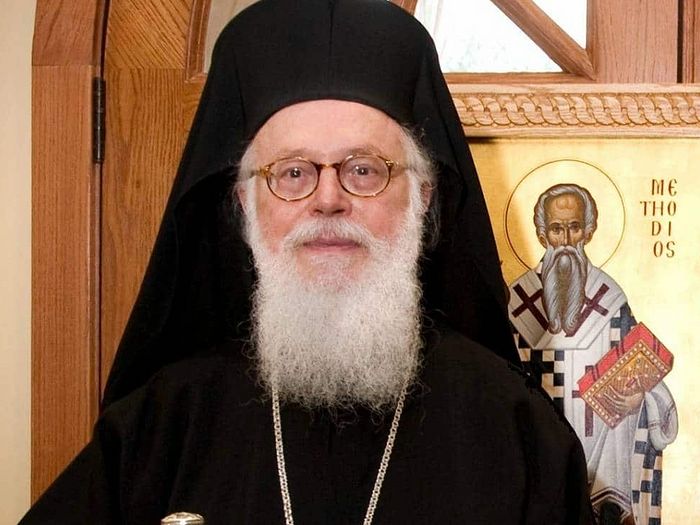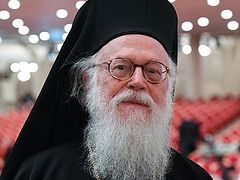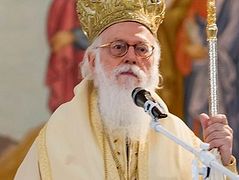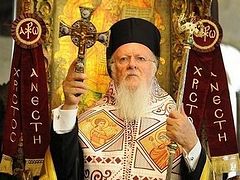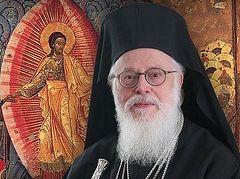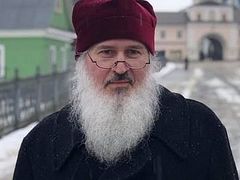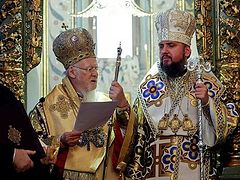† Anastasios
Archbishop of Tirana, Durrës and All Albania
This address by Archbishop Anastasios, primate of Albania, was translated from the original Greek for the official website of the Church of Albania.
1. For months, much has been said and written about the Ukrainian ecclesiastical problem. What is most crucial and most necessary, however, is to emphasize Orthodoxy’s imperative of unity. St. John Chrysostom proclaimed, in an expression of Patristic spiritual experience and ecclesiastical tradition, that: “The name of the Church is not one of separation, but of union and concord. The Church came into being, not that we might be divided, but that we might be joined together”. And elsewhere: “Nothing exasperates God so much as a Church divided”. Any action must therefore take most seriously into account this truth: The unity of the Church is before and above all.
2. The ecclesiastical events of the past year have created a new reality, with the obvious involvement of geopolitical interests and expediencies. This new situation cannot be ignored, directly or indirectly. The granting of Autocephaly to the Orthodox Church of Ukraine has not brought the desired Orthodox unity and peace, as happened with all previous cases of granting Autocephaly. The central figure in the Ukrainian problem, the self-proclaimed “Patriarch” Filaret, ultimately refused the Tomos, criticising both its content and its purpose. The divisions have spread to other regions and to the Orthodox world in general. At the same time, the supreme sacrament of unity and forgiveness – the Holy Eucharist – has been used by the Patriarchate of Moscow during the confrontation as a means of applying pressure. Many millions of Orthodox around the world have broken eucharistic communion with the Ecumenical Patriarchate, the Patriarchate of Alexandria, and the Church of Greece. Moreover, the question of the validity of the ordinations performed by the self-proclaimed “Patriarch” Filaret when he was excommunicated and anathematized continues to divide. The painful consequences of this surgical intervention are all too well known, not only among the Orthodox circles but throughout the Christian world.
3. For the moment, a worrying silence prevails in most of the Orthodox Churches. The apparent political pressures on both sides are wounding the spiritual authority of the Orthodox Church, while the mobilisation of irresponsible persons to deride those who express different opinions, while at the same time flattering those whom they support, debases inter-Orthodox dialogue at a critical moment for Orthodoxy. Some ecclesiastical circles have expressed the expectation that all the Orthodox Churches will gradually recognise the recipient of the Tomos. Moreover, even if some autocephalous Churches do recognise him, several others have declared in their public pronouncements that they will continue to refuse to do so. The resulting ethno-racial fragmentation (into Greeks, Slavs, and those who desire harmonious relations with all) deals a grave blow to the multinational, multi-cultural, and ecumenical character of Orthodoxy. Time does not necessarily correct and heal ecclesiastical schisms; rather, it deepens and perpetuates them.
4. Finding ways to transcend this ecclesiastical polarisation is now a matter of urgency. In order to face various conflicts in today’s world the first step is de-escalation. It is widely accepted and often repeated on the international stage that tensions can be faced only by means of serious dialogue. Every attempt should be made to re-establish communication between the primary parties in the crisis as soon as possible, so that they may exchange creative proposals. Persons who can contribute to the immediate initiation of the deliberations exist in the Orthodox Church.
5. It is time to lay the foundations for new efforts on the truths of Orthodox tradition, which are rooted in Holy Scripture, for example: “But why do you call Me ‘Lord, Lord,’ and do not do the things which I say?” (Luke 6:46, cf. Mt.7:21); “But I say to you, love your enemies, bless those who curse you, do good to those who hate you...” (Mt. 5:44); “And forgive us our trespasses, as we forgive those who trespass against us...” (Mt. 6:12); “...endeavouring to keep the unity of the Spirit in the bond of peace” (Eph. 4:3; see also Gal. 5:15). Following the commands of the Lord faithfully we will discern new pathways to overcoming the violence.
6. Solutions exist. God will enlighten us that we may determine them. They will not, of course, be achieved through exchanges of insulting and threatening texts, neither by extra- ecclesiastical interventions nor can they be imposed unilaterally or come automatically with the passing of time. Every delay deteriorates the already painful situation. And even if “ultimately” “in the future” a solution will be found, many sorrowful pages will have already been accumulated in the history of Orthodoxy. The fundamental principle of Conciliarity, which has always underlain the advancement of the Orthodox Church, is the only key to finding a way out of the existing crisis. Gathering together in the Holy Spirit, in mutual respect and with the sole aim of finding a peaceful arrangement, we have the possibility of reaching a solution acceptable to the whole Orthodox Church. The longer the implementation of pan-Orthodox Conciliarity is delayed, the more dangerous the multiple fissures in the Orthodox Oikoumene become. Modern technology intensifies the clamour, the confusion, and the turmoil among the Orthodox and by this the creditability of Orthodoxy in today’s world is decreasing.
7. With the approach of Christmas, the great feast of the coming of the Son and Word of God to humankind, the amazing initiative of the Father for the reconciliation with the human race, we humbly raise our supplication, our appeal, for a hastening of the steps towards reconciliation, so that we may be entitled to join all our voices in singing “Glory to God in the highest, and on earth peace, good will to men.” (Luke 2:14) “All things are of God, who has reconciled us to Himself through Jesus Christ, and has given us the ministry of reconciliation” (2 Cor. 5:18).
The initiative for the healing treatment of the new reality undoubtedly is accorded to the Ecumenical Patriarchate. But all the Autocephalous Churches, all Orthodox without exception, bear the responsibility to contribute to reconciliation (katallagi).
Reconciliation will bring peace to millions of faithful people. At the same time, Orthodoxy will confirm its spiritual ability to heal wounds, in the light of the Word of God and the power of the Holy Spirit. Confirming the truth that she is the One, Holy, Catholic, and Apostolic Church, whose Head is Christ the incarnate Son of God, “for whom and by whom all things exist” (Heb. 2:10), who “...has given us the ministry of reconciliation” (2 Cor. 5:18).

